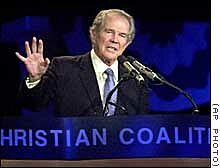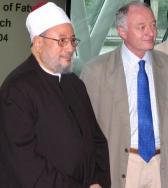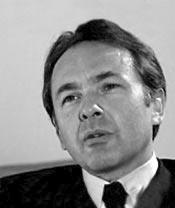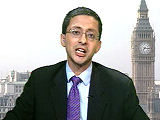 State Department spokesman Sean McCormack called Pat Robertson’s remarks about Venezuelan President Hugo Chavez “inappropriate”, but stopped short of condemning them. Defense Secretary Donald H. Rumsfeld said the Pentagon isn’t in the business of killing foreign leaders, but he also did not denounce Robertson or his remarks. “He’s a private citizen. Private citizens say all kinds of things all the time”, Rumsfeld said.
State Department spokesman Sean McCormack called Pat Robertson’s remarks about Venezuelan President Hugo Chavez “inappropriate”, but stopped short of condemning them. Defense Secretary Donald H. Rumsfeld said the Pentagon isn’t in the business of killing foreign leaders, but he also did not denounce Robertson or his remarks. “He’s a private citizen. Private citizens say all kinds of things all the time”, Rumsfeld said.
Democrats called the Bush administration’s response tepid, and said it lends credence to the notion that the White House doesn’t want to offend some of its most loyal supporters. “It seems they are shuffling their feet when they should be running away from what Pat Robertson said”, Democratic political consultant Steve McMahon said. “That this president, who projects himself as brave and bold, doesn’t want to stand up to his own right wing is ironic.”
Associated Press, 24 August 2005
You can just imagine what the response of the Bush administration would be if an American Muslim leader were to call for the killing of a pro-US head of state. And their cries of outrage would of course be accompanied by articles explaining how the ideology of Islam inspires such violent fanaticism. However, when it’s the Reverend Pat Robertson – founder of the Christian Coalition of America, the man who supported Bush’s re-election last year and said he believed the president is blessed by God – calling for the murder of a supposed supporter of “Muslim extremism”, it’s a very different matter.

 Daniel Pipes asks: “Do terrorist atrocities in the West, such as the attacks of September 11, 2001 and those in Bali, Madrid, Beslan, and London, help radical Islam achieve its goal of gaining power? No, they are counterproductive. That’s because radical Islam has two distinct wings – one violent and illegal, the other lawful and political – and they exist in tension with each other. The lawful strategy has proven itself effective, but the violent approach gets in its way.”
Daniel Pipes asks: “Do terrorist atrocities in the West, such as the attacks of September 11, 2001 and those in Bali, Madrid, Beslan, and London, help radical Islam achieve its goal of gaining power? No, they are counterproductive. That’s because radical Islam has two distinct wings – one violent and illegal, the other lawful and political – and they exist in tension with each other. The lawful strategy has proven itself effective, but the violent approach gets in its way.” “France, ridiculed when Bernard Stasi and his commission first recommended a ban on all religious symbols in schools, has since excited the interest of those who note that this is, nevertheless, the country with the largest number of Muslims, with a population far greater than either Germany or the UK. The social control, they also remark, exerted by the combined results of secularism, conscious integration and a preventative security policy has led – according to the inverse terms of multiculturalism – to France being spared from terror attacks for the past decade.”
“France, ridiculed when Bernard Stasi and his commission first recommended a ban on all religious symbols in schools, has since excited the interest of those who note that this is, nevertheless, the country with the largest number of Muslims, with a population far greater than either Germany or the UK. The social control, they also remark, exerted by the combined results of secularism, conscious integration and a preventative security policy has led – according to the inverse terms of multiculturalism – to France being spared from terror attacks for the past decade.” “Sometimes things are altogether more simple than we wish them to be. Sir Iqbal Sacranie, the eminent chairman of the Muslim Council of Britain, recently refused to attend the Holocaust memorial day. When asked why this was so, he muttered something about how lots of people had been killed all over the place, not least the poor Palestinians and why shouldn’t we remember them, etc., etc. In the liberal press, extravagant excuses were made for Sacranie and his ludicrous chef de cabinet, Inayat Bunglawala. But I suspect that the simple answer, the one we didn’t want to hear, is the most accurate: Sacranie and Mr Bunglawala don’t like Jews. They are both unequivocal anti-Semites.”
“Sometimes things are altogether more simple than we wish them to be. Sir Iqbal Sacranie, the eminent chairman of the Muslim Council of Britain, recently refused to attend the Holocaust memorial day. When asked why this was so, he muttered something about how lots of people had been killed all over the place, not least the poor Palestinians and why shouldn’t we remember them, etc., etc. In the liberal press, extravagant excuses were made for Sacranie and his ludicrous chef de cabinet, Inayat Bunglawala. But I suspect that the simple answer, the one we didn’t want to hear, is the most accurate: Sacranie and Mr Bunglawala don’t like Jews. They are both unequivocal anti-Semites.”